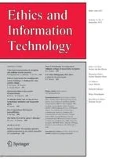Abstract
I argue that the problem of ‘moral luck’ is an unjustly neglected topic within Computer Ethics. This is unfortunate given that the very nature of computer technology, its ‘logical malleability’, leads to ever greater levels of complexity, unreliability and uncertainty. The ever widening contexts of application in turn lead to greater scope for the operation of chance and the phenomenon of moral luck. Moral luck bears down most heavily on notions of professional responsibility, the identification and attribution of responsibility. It is immunity from luck that conventionally marks out moral value from other kinds of values such as instrumental, technical, and use value. The paper describes the nature of moral luck and its erosion of the scope of responsibility and agency. Moral luck poses a challenge to the kinds of theoretical approaches often deployed in Computer Ethics when analyzing moral questions arising from the design and implementation of information and communication technologies. The paper considers the impact on consequentialism; virtue ethics; and duty ethics. In addressing cases of moral luck within Computer Ethics, I argue that it is important to recognise the ways in which different types of moral systems are vulnerable, or resistant, to moral luck. Different resolutions are possible depending on the moral framework adopted. Equally, resolution of cases will depend on fundamental moral assumptions. The problem of moral luck in Computer Ethics should prompt us to new ways of looking at risk, accountability and responsibility.
Similar content being viewed by others
Notes
Rogerson (2002, p. 159).
Tavani (2004, p. 87).
Williams (1981).
Scanlon (2008, p. 124).
Ibid, p. 198.
See, for example, Nussbaum (2001).
Moor (2008).
Johnson (2001).
Fearn (2005).
Aristotle (1910–1952).
Kant (1873, p. 10).
Williams (1981, p. 21).
Ibid, p. 20.
Nagel (2000, p. 356).
Dickenson (2003).
Op. cit.
Op. cit.
See Ackrill (1988, p. 140).
Rogerson (2002, p. 177).
Tavani (2004, p. 95).
Ibid, p. 315.
ibid, pp. 318–319.
See Rogerson (2002).
Athanassoulis (2005, p. 19).
Michaelson (2008).
See Booker and North (2007).
Ince (2010).
Athanassoulis (2005, p. 8).
Ibid, p. 161.
See Nagel (2000).
Nagel (2000, p. 357).
Ibid, p. 359.
Prior (1956).
Kurzweil (2005, p. 9).
Horner (2007).
Dickenson (2003, p. 13).
Baggini and Fosl (2007, p. 223).
Ackrill (1988, p. 154).
Nagel (2000, p. 361).
Athanassoulis (2005, p. 114).
Nagel (2000, p. 361).
Tavani (2004, pp. 103–105).
Athanassoulis (2005, pp. 162–167).
Ibid, p. 163).
Scanlon (2008, p. 202).
Nagel (2000, p. 361).
Richards (1986).
Ibid, p. 206.
Nagel (2000, p. 363).
See Johnson (2001, p. 191).
See Tavani (2004, p. 111).
Nagel (2000, p. 363).
Richards (1986, p. 204).
Athanassoulis (2005, p. 163).
References
Ackrill, J. L. (1988). Aristotle the philosopher. Oxford: Clarendon Press.
Aristotle. (1910–1952). Ethica Nicomachea. In J. A. Smith & W. D. Ross (Eds.), The works of Aristotle translated into English (Vol. 9). Oxford: Oxford University Press.
Athanassoulis, N. (2005). Morality, moral luck and responsibility: Fortune’s web. Houndmills, Basingstoke: Palgrave Macmillan.
Baggini, J., & Fosl, P. S. (2007). The ethics toolkit: A compendium of ethical concepts and methods. Oxford: Blackwell.
Booker, R., & North, R. (2007). Scared to death from BSE to global warming: Why some scares are costing us the earth. London: Continuum.
Dickenson, D. (2003). Risk and luck in medical ethics. Cambridge: Polity Press.
Fearn, N. (2005). Philosophy: The latest answers to the oldest questions. London: Atlantic Books.
Horner, D. S. (2007). Digital futures: Promising ethics and the ethics of promising. In L. Hinman, et al. (Eds.), Proceedings of CEPE 2007: The 7th international conference of computer ethics: Philosophical enquiry, pp 194–204, University of San Diego, July 12–14, 2007. Center for Telematics and Information Technology, Enschede, The Netherlands.
Ince, D. (2010). The matrix recoded. Times Higher Education, 8 April, pp. 41–42.
Johnson, D. G. (2001). Computer ethics (3rd ed., pp. 19–24). Upper Saddle River, NJ: Pearson.
Kant, I. (1873). Fundamental principles of the metaphysic of morals. In: T. K. Abbott (Trans.), Kant’s theory of ethics or practical philosophy (1st ed.). London: Longmans, Green, Reader and Dyer.
Kurzweil, R. (2005). The singularity is near: When humans transcend biology. London: Gerald Duckworth.
Michaelson, C. (2008). Moral luck and business ethics. Journal of Business Ethics, 83(4), 773–787.
Moor, J. (2008). Why we need better ethics for emerging technologies. In J. van den Hoven & J. Weckert (Eds.), Information technology and moral philosophy (pp. 26–29). Cambridge: Cambridge University Press.
Nagel, T. (2000). Moral luck. In V. Pojman (Ed.), The moral life: An introductory reader in ethics and literature (pp. 354–367). New York: Oxford University Press.
Nussbaum, M. C. (2001). The fragility of goodness: Luck and ethics in Greek tragedy and philosophy. Cambridge: Cambridge University Press.
Prior, A. N. (1956). Symposium: The consequences of actions. Proceedings of the Aristotelian Society, Supplement, 30, 91–99.
Richards, N. (1986). Luck and desert. Mind, 95(378), 198–209.
Rogerson, S. (2002). Computers and society. In R. E. Spier (Ed.), Science and technology ethics (pp. 159–179). London: Routledge.
Scanlon, T. M. (2008). Moral dimensions: Permissibility, meaning. Cambridge, MA: blame. Belknap Press of Harvard University Press.
Tavani, H. T. (2004). Ethics and technology: Ethical issues in and age of information and communication technology. Hoboken, NJ: Wiley.
Williams, B. (1981). Moral luck: Philosophical papers 1973–1980. Cambridge: Cambridge University Press.
Author information
Authors and Affiliations
Corresponding author
Rights and permissions
About this article
Cite this article
Horner, D.S. Moral luck and computer ethics: Gauguin in cyberspace. Ethics Inf Technol 12, 299–312 (2010). https://doi.org/10.1007/s10676-010-9248-0
Published:
Issue Date:
DOI: https://doi.org/10.1007/s10676-010-9248-0




